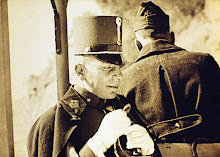
"I was a so-called star because of my limitations and that was always the case. I couldn't do any accents. So I had to pretend. Luckily I was tall, had curly hair and a good voice. I only had to stamp my foot and I'd play the lead -- because I couldn't play character parts."
http://themave.com/Cotten/bio2.htm
heigh ceiling
http://www.imdb.com/media/rm2672400384/nm0001072
see (v.)
O.E. seon (contracted class V strong verb; past tense seah, pp. sewen), from P.Gmc. *sekhwanan (cf. O.S., O.H.G. sehan, M.H.G., Ger. sehen, O.Fris. sia, M.Du. sien, O.N. sja, Goth. saihwan), from PIE base *sekw- "to see," which is "probably" the same base that produced words for "say" in Greek and Latin, and also words for "follow" (cf. L. sequor), but "opinions differ in regard to the semantic starting-point and sequences" [Buck]. Thus see could originally mean "follow with the eyes." Used in M.E. to mean "behold in the imagination or in a dream" (c.1200), "to recognize the force of (a demonstration)," also c.1200, "often with ref. to metaphorical light or eyes" [OED], and "to learn by reading" (1426). Past tense saw developed from O.E. pl. sawon.
"When you have seen one of their Pictures, you have seen all." [Blake, c.1811]
Sense of "escort" (e.g. to see someone home) first recorded 1607 in Shakespeare. Meaning "to receive as a visitor" is attested from c.1500. Gambling sense of "equal a bet" is from 1599. See you as a casual farewell first attested 1891. Seeing Eye dog first attested 1929, Amer.Eng., trademarked by Seeing Eye Inc. of New Jersey.
http://www.etymonline.com/index.php?term=see
